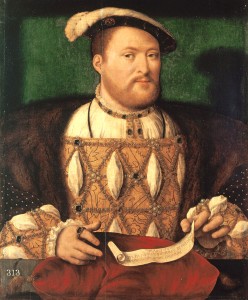 On 28th May 1533, five days after he declared the annulment of Henry VIII’s marriage to Catherine of Aragon, Archbishop Thomas Cranmer proclaimed the validity of Henry VIII’s marriage to Anne Boleyn following a secret enquiry at Lambeth Palace.
On 28th May 1533, five days after he declared the annulment of Henry VIII’s marriage to Catherine of Aragon, Archbishop Thomas Cranmer proclaimed the validity of Henry VIII’s marriage to Anne Boleyn following a secret enquiry at Lambeth Palace.
Henry VIII and Anne Boleyn had already been married four months, long before the annulment, but Henry believed that his marriage to Catherine had never been valid because she was his brother’s widow. Convocation and the Dunstable court agreed with him, ruling that the Pope had no authority to issue a dispensation for a marriage which was contrary to God’s law. A special secret enquiry into the King’s second marriage was held at Lambeth Palace and the marriage had been deemed valid.
Henry VIII was not unusual using a dispensation to allow a marriage and then arguing for an annulment on the grounds that the dispensation was contrary to God’s law. In his recent series TV series “Sex and the Church”, Diarmaid MacCulloch examined the Church’s involvement in marriage. He talked about the case of Robert de Mowbray, Earl of Northumberland, and his wife Maude in the 11th century. At the time, Church law was that no-one could marry within seven degrees of consanguinity. This made it difficult for the new Norman settlers in England because it meant that everyone they knew was out of bounds. Robert and Maude were Normans and were distant cousins affected by this law, so they got a dispensation for their marriage. The marriage turned sour within two years due to Robert rebelling against the king and being branded a traitor. Maude wanted out of the marriage and so appealed to the Pope for a dispensation, alleging that as they were cousins that their marriage was against Church law and so should be annulled. She was granted an annulment and then went on to apply for another dispensation to marry another of her cousins, Nigel d’Aubigny. Maude was unable to provide Nigel with an heir so he promptly argued for an annulment so that he could remarry. It all sounds rather mad to us today – how can a Pope issue a dispensation to allow a marriage and then grant an annulment on the basis that the dispensation wasn’t valid?
So, Henry’s request for an annulment actually wasn’t that unusual and the Pope would have granted it if Catherine had not opposed it as she did, and if she hadn’t been the Emperor’s aunt. It’s why Cardinal Campeggio, the papal legate, tried to convince Catherine to enter a convent in 1529. I often wonder what would have happened if Catherine had agreed to the annulment in 1527/8, it’s a big “what if”!